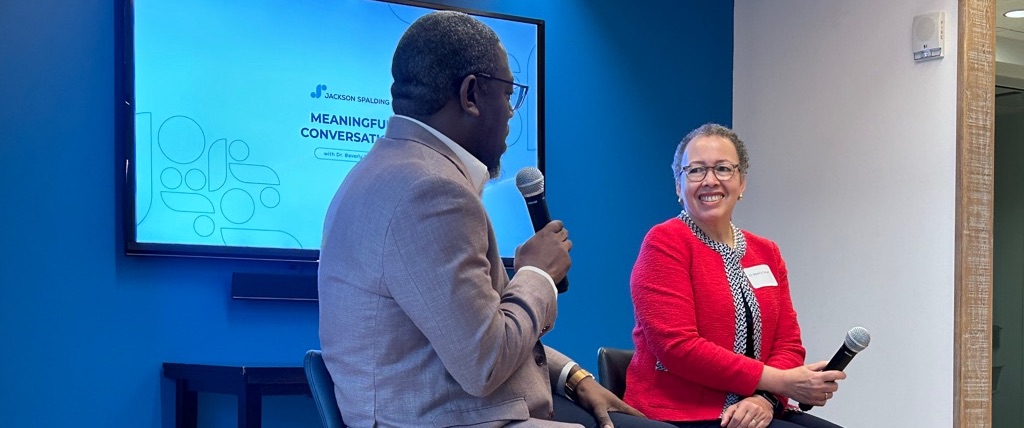October 2023

Last week, Jackson Spalding had the honor of hosting Dr. Beverly Tatum, esteemed author of the best-selling book, “Why Are All the Black Kids Sitting Together in the Cafeteria? And Other Conversations about Race,” and President Emerita of Spelman College, as the featured guest in our community-driven leadership series, “Meaningful Conversations: A Series on Leadership.”
During this one-hour session, Charles Edwards, Jackson Spalding’s Coaching Practice lead and the agency’s DEI team lead, engaged in a thought-provoking discussion with Dr. Tatum about her background, how the landscape of race in America continues to evolve, and the part we can all play in improving race relations.
Dr. Tatum, a distinguished psychologist, author, and educator, has dedicated her career to researching and writing about racism in education, racial identity development, and the assimilation of Black families and teenagers in predominantly white communities. She earned her Bachelor of Arts in Psychology from Wesleyan University and her Master of Arts and Ph.D. in Clinical Psychology from the University of Michigan.
Notably, Dr. Tatum served as the ninth president of Spelman College, the oldest historically Black women’s college in the United States, from 2002-2015. Her retirement from Spelman College was followed by her appointment last year as the interim president of Mount Holyoke.
Dr. Tatum’s most acclaimed work, “Why Are All the Black Kids Sitting Together in the Cafeteria,” remains a landmark exploration of racial identity development, drawing on her personal experiences to underscore the significance of this process.
Charles’ conversation with Dr. Tatum unearthed profound insights and experiences that have shaped her perspective on longstanding issues in American society and her approach to leading difficult conversations about race and inclusion. Her unwavering piece of advice: keep asking questions.
Tatum’s work focuses on understanding the complex process of racial identity formation, particularly among young people. She highlights how this process can significantly impact individuals’ self-esteem, sense of belonging, and overall mental well-being. Being a minority in various spaces can take a toll on the mental health of African Americans, especially teenagers, which is a central concern addressed by Dr. Tatum’s research and advocacy.
She argues that minorities often grapple with issues related to racial stereotypes, prejudice and discrimination, which can lead to feelings of alienation and a search for community and identity with others who share similar racial backgrounds.
Whether teaching students or facilitating leadership group discussions, Dr. Tatum encourages her audiences to think about the psychological impact of racism in three steps: “What? So what? And now what?” She asks, “What is racism? How do we understand that? So, what difference does it make in terms of how we think about ourselves and other people?”
This framework underscores the importance of considering the psychological impact of racism through a structured approach – comprehending racism, accessing its implications, and exploring the path forward. It’s also a great leadership communications framework for any topic.
As we mark the 20th anniversary of “Why Are All the Black Kids Sitting Together in the Cafeteria?” Charles engaged Dr. Tatum in a discussion about the contemporary landscape of racism and the evolving nature of racial discourse in America since the book’s initial publication. Dr. Tatum said, “The question people ask today is, do we have to talk about it? Not do we still have it, but do we have to talk about it?”
Dr. Tatum referenced her recommended steps – What? So what? Now what? “We must introspect, examine how we interact with others, our thought processes regarding others, and our engagement with individuals from different backgrounds.”
By delving inward, she explained, we gain the ability to ‘unlearn’ and challenge the deeply entrenched systems that have persisted for centuries. During the discussion, Dr. Tatum led an exercise that prompted attendees to reflect on when they first became aware of race and whether they openly discussed those experiences.
She then connected this introspection to the professional environment, emphasizing the importance of managing race and diversity workshops within our workplaces. Dr. Tatum acknowledged the prevailing discomfort surrounding the topic of race and how being conditioned not to discuss it can hinder open dialogue. She recognized that “people will sometimes want to withdraw from the conversation.”
Most importantly, Dr. Tatum implores people to continue to focus on having these continued talks about race instead of ignoring them. In her enlightening discourse, Dr. Tatum shed light on the insidious nature of psychological racism, urging adults to confront and dismantle deep-seated roots. Her wisdom and insights are a powerful catalyst for meaningful change and a more equitable future.